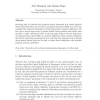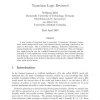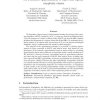118
Voted
ENTCS
2006
15 years 2 months ago
2006
This paper describes a Java-based framework for the development of componentbased software systems supporting the specification of the logic of component interactions as a first-c...
127
Voted
ENTCS
2006
15 years 2 months ago
2006
Rewriting logic is a flexible and expressive logical framework that unifies algebraic denotational semantics and structural operational semantics (SOS) in a novel way, avoiding th...
140
Voted
IJAR
2008
15 years 2 months ago
2008
Possibilistic Defeasible Logic Programming (P-DeLP) is a logic programming language which combines features from argumentation theory and logic programming, incorporating the trea...
148
Voted
ENTCS
2006
15 years 2 months ago
2006
A logic for reasoning about states of basic quantum imperative programs is presented. The models of the logic are ensembles obtained by attaching probabilities to pairs of quantum...
141
Voted
ENTCS
2006
15 years 2 months ago
2006
Parkinson, Bornat, and Calcagno recently introduced a logic for partial correctness in which program variables are treated as resource, generalizing earlier work based on separati...
115
Voted
IIE
2008
15 years 2 months ago
2008
Mathematical logic is a discipline used in sciences and humanities with different point of view. Although in tertiary level computer science education it has a solid place, it does...
104
Voted
IGPL
2008
15 years 2 months ago
2008
A new version of transition logic is presented. It integrates (dynamic) transitions, which change world states, and classical (static) reasoning, restricted in the paper to Horn l...
114
Voted
IGPL
2008
15 years 2 months ago
2008
We show that IPC, K4, GL, and S4, as well as all logics inheriting their admissible rules, have independent bases of admissible rules. Key words: admissible rule, independent basi...
IGPL
2008
15 years 2 months ago
2008
A critical view of the alleged significance of Belnap four-valued logic for reasoning under inconsistent and incomplete information is provided. The difficulty lies in the confusi...
ECCC
2006
15 years 2 months ago
2006
We formulate a formal syntax of approximate formulas for the logic with counting quantifiers, SOLP, studied by us in [1], where we showed the following facts: (i) In the presence ...



